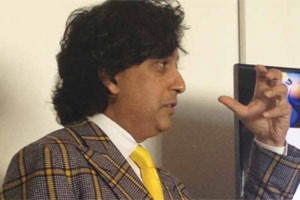Learning more about brain science can help us support leaders who are confronted with unfamiliar stressors and challenges.
In over 19 years working closely with CEOs and other C-suite executives, we at Duke Corporate Education have repeatedly heard leaders express the sentiment that they are being confronted by increasingly unfamiliar and complex challenges in their work, yet feel less equipped to handle them. In an attempt to find solutions for these challenges, we gathered to try to understand the brain science behind leaders’ reactions when faced with untenable levels of uncertainty.
If, as learning and development professionals, we understand the brain better, perhaps we can support our leaders to face turmoil more effectively. Dr. Srini Pillay, founder and CEO of NeuroBusiness Group, spends his working life trying to help people understand more about how the brain works in such situations, and is ideally suited to lead such a conversation.
Stress blocks learning
Pillay’s remarks confirmed our suspicions – stress precipitates habit pathways in the brain. When under pressure, we resort to what we know, rather than opening our minds to what we don’t know. In essence, learning becomes irrelevant at the precise moment when we need it most. So the key question remains: are there methods we can employ that can both educate and enable leaders to keep learning when they are overwhelmed, rather than shutting down? Pillay likens it to constructing a building in an earthquake. The buildings – and leaders – that survive definitely don’t have the same characteristics as the ones that crumble.
So it’s not so much about training leaders to cope in a crisis, but about laying down the foundations for resilience so that when crisis strikes, the ability to learn prevails over the need to be right. In new times, leaders need to try new things – the polar opposite of avoiding mistakes.
And making learning sticky, is, as we know, a challenging process. Learning is even more than double loop, it’s multi-layered. To learn, an individual needs to receive inputs, retain these in short-term memory, then lay them down in the long-term memory and retain the learning in compressed files, ready to be retrieved on demand.
It’s a complex process and it’s why learning professionals worry about measuring the return on investment for the training expenditure. Partly, it’s about value for money, but crucially it’s also about demonstrating that effective learning actually took place and resulted in change. During the session, Pillay asked a lot of questions, demonstrating how to stimulate ownership of the material he’s delivering from his listeners, as ownership is the first step in retaining the ideas and much more effective than passive listening. He even made us chant technical words that describe the brain – because the words shouldn’t just belong to him.
If you are trying to change personal habits, or if you are involved in learning design, you are effectively re-engineering the brain. So why not understand more about the brain in this context?
Challenging learning orthodoxies
Complex, global, interdependent problems and continuous change at all levels mean that step one in continuing to learn is for a leader is to have the courage to be able to say “I don’t know”. We have talked a lot about a post-command and control world as a precursor to dealing effectively with volatility, uncertainty, complexity and ambiguity (VUCA); yet the reality is that command and control as a leadership style is alive and well and living in many companies. VUCA exacerbates this unproductive leadership style, as leaders take refuge in their comfort zones when faced with uncertainty. Starting with “I don’t know” allows a leader’s brain to search for relevant, rather than habitual, solutions.
Our brains are better at detecting fear than any other emotion. Fear is registered in the unconscious without us even realizing it, so that, if asked, we would say that we were not afraid, while our bodies tell a different story. The amygdala, the emotional center of the brain, registers fear first and the leader hits a wall in thinking and reacts as though nothing new has occurred – taking comfort in known routines. As one definition of insanity is to keep doing the same things while expecting different results, it’s not surprising that the leader thus starts making recurrent mistakes – old solutions don’t address the new challenges.
The brain at rest consumes an astonishing 20-25% of our energy resources, and when distracted, detached or suppressing emotions, our anxiety levels increase and use up even more energy. That’s why stress makes us feel tired. If leaders could only view their authority as influence-based, rather than control-based, and admit to the stress they are feeling, energy would be released to meet the challenges facing them. How to achieve this nirvana? Pillay offers some heuristics that can help:
Heuristics for learning to face new challenges
- Get fear out of the system.
- Increase self-insight to have the confidence to fail.
- Be aware of, and avoid, the psychological traps.
- Engage in active, not passive, learning.
- Learn to unlearn.
- Don’t rely so much on goals, SMART or otherwise.

DR SRINI PILLAY
Srini Pillay MD is CEO of global organization NeuroBusiness Group (www.neurobusinessgroup.com), which helps people use the latest research in brain science to lead happier, more productive lives. He is also assistant professor of psychiatry at Harvard Medical School and teaches in the Executive Education Program at Harvard Business School and Duke Corporate Education. He graduated with the greatest number of awards during residency training at Harvard and was one of the top award winners in the US. He was formerly director of the Outpatient Anxiety Disorders Clinic at Harvard’s largest psychiatric facility.
Srini Pillay talks about how the brain is wired to help us achieve success and goals
As a strategy consultant and certified master executive coach, his expertise is in helping companies reach goals via coaching strategy acceleration, change management, innovation, sales optimization, stress management and other methods. Dr Pillay explains unconscious factors that impact corporate performance and can outline specific brain-based interventions. He brings 17 years of experience in brain imaging and an international reputation as a human behaviour expert. His integrated learning and coaching approach fills in gaps that have long been ignored in the coaching and learning space.
He has authored award-winning book Life Unlocked: 7 Revolutionary Lessons to Overcome Fear (Rodale, 2010), voted Motivational Book of the Year by “Books for a Better Life”, and one of the five best health books for 2010 by Men’s Health.
In addition, he has authored: Your Brain and Business: The Neuroscience of Great Leaders (FT Press, 2011) and The Science Behind the Law of Attraction. Clients include some of the world’s leading consulting companies, international multilaterals such as the UN and The World Bank as well as Fortune 50 and Fortune 500 companies such as Lockheed Martin and Novartis. His programmes on organizational change, high stakes leadership, managing stress, diversity and inclusion, organizational agility and creativity and innovation have received very high scores on their relevance and applicability to organizational challenges.
Dr Pillay has been invited to speak and teach in France, Brazil, England, Switzerland, India, Greece, Bulgaria and Romania at companies including The MITRE Corporation, Novartis, Genzyme, The World Bank, Lockheed Martin and CEO Clubs of Greece. He has been featured in Forbes, The New York Times, Greece’s Financial Times, Brazil’s Época Magazine, CNN Headline News, Fox News Boston and Business Television Network in Canada.
He has recently published papers on Applying The Brain Science of Conscious Capitalism in The Ivey Business Journal, Applying The Brain Science of Innovation on “The Mark” and “Supply Chain Management: Unique Insights on Collaboration and Communication from Brain Science” in Material Handling and Logistics. He is currently focusing his efforts on software development for sustainable learning and connecting this to applied brain-based research. Dr Pillay was recently featured on 33voices.com as one of the most progressive thinkers of our time.
An adapted version of this article appeared on the Dialogue Review website.



